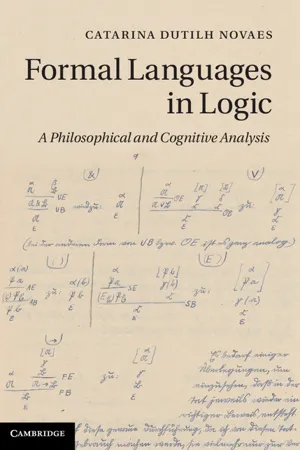
- English
- PDF
- Available on iOS & Android
About this book
Formal languages are widely regarded as being above all mathematical objects and as producing a greater level of precision and technical complexity in logical investigations because of this. Yet defining formal languages exclusively in this way offers only a partial and limited explanation of the impact which their use (and the uses of formalisms more generally elsewhere) actually has. In this book, Catarina Dutilh Novaes adopts a much wider conception of formal languages so as to investigate more broadly what exactly is going on when theorists put these tools to use. She looks at the history and philosophy of formal languages and focuses on the cognitive impact of formal languages on human reasoning, drawing on their historical development, psychology, cognitive science and philosophy. Her wide-ranging study will be valuable for both students and researchers in philosophy, logic, psychology and cognitive and computer science.
Frequently asked questions
- Essential is ideal for learners and professionals who enjoy exploring a wide range of subjects. Access the Essential Library with 800,000+ trusted titles and best-sellers across business, personal growth, and the humanities. Includes unlimited reading time and Standard Read Aloud voice.
- Complete: Perfect for advanced learners and researchers needing full, unrestricted access. Unlock 1.4M+ books across hundreds of subjects, including academic and specialized titles. The Complete Plan also includes advanced features like Premium Read Aloud and Research Assistant.
Please note we cannot support devices running on iOS 13 and Android 7 or earlier. Learn more about using the app.
Information
Table of contents
- Cover
- FORMAL LANGUAGES IN LOGIC
- Title
- Copyright
- Contents
- Acknowledgements
- Introduction
- PART I
- PART II
- Conclusion
- References
- Index